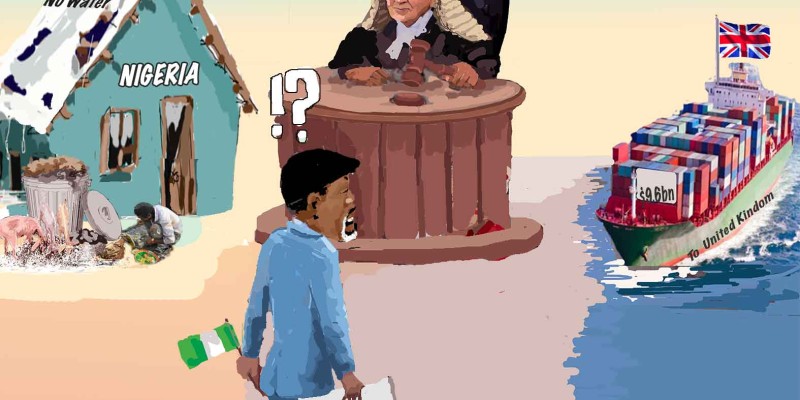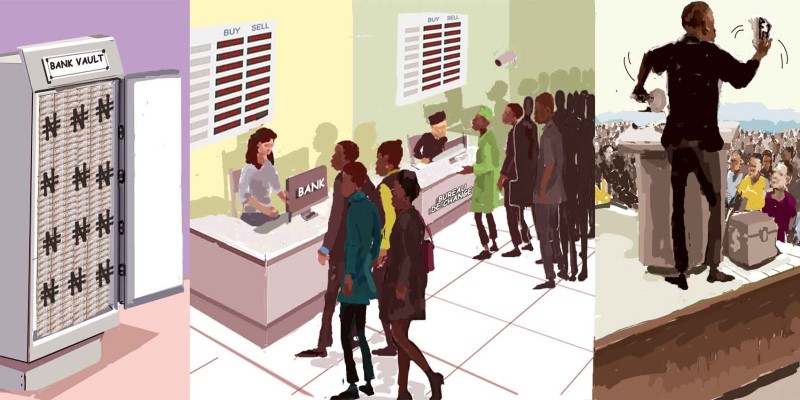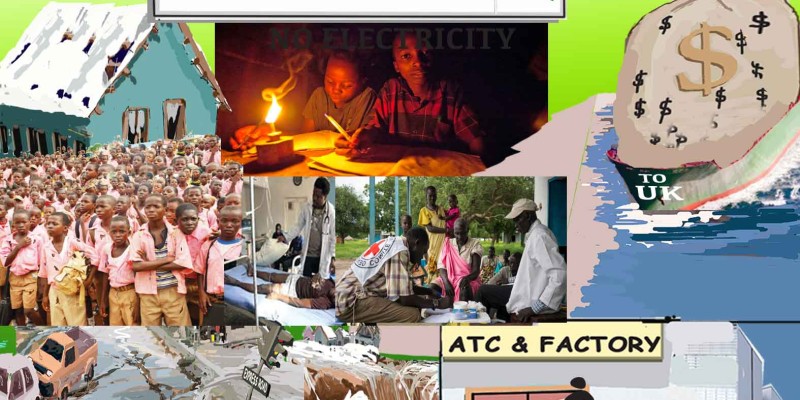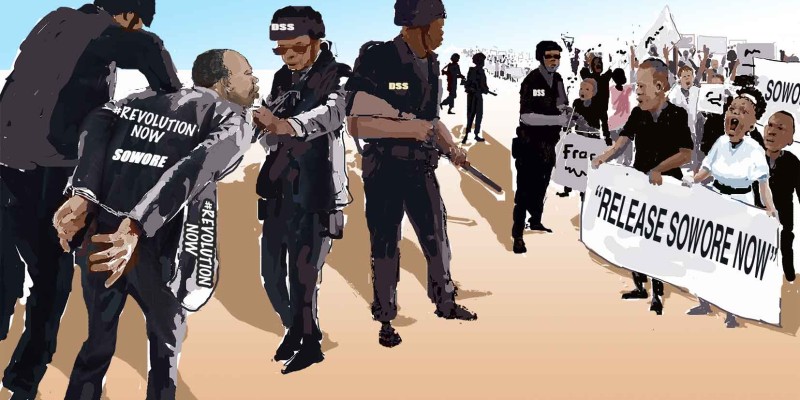Font size:
Print
CHEAPER FOREIGN LOANS OR DEBT TRAP?
By: Sir Henry Olujimi Boyo (Les Leba) first published in October 2018
INTRO:
Last week, this column republished “The Treasury Bill Scam Continues to Flourish” The article uses relevant references to draw attention to CBN’s practices which threaten the real sector, efficient allocation of resources, and plunge the nation into endless debt. This republication can be found using the below link.
(See www.betternaijanow.com for this series and more articles by the Late Sir Henry Boyo)
Today’s republication discusses decreasing capital allocation rates from year to year despite Nigeria’s huge infrastructural deficit. It questions the rising debt service charges and the‘promised’ changes by the government to ensure a reliable and transparent procurement process. This article maintains its relevance in emphasizing Nigeria’s rising debt profile which is still a cause for concern. Crucial sectors remain wanting and the nation’s infrastructure continues to degrade with no clear actions on the part of government towards improvement. Kindly read on for more insight.
As you read through the below article taking note of previous events and rates, keep in mind its initial publication (2018).
The Minister for Budget and National Planning, Udoma Udo Udoma, revealed to an audience, comprising the Organised Private Sector, Media and Civil Society Organisations, in Abuja, on October 18th 2018, that in contrast to the 2018 total budget of N9.12tn, the sum of N8.651tn will be budgeted for 2019; i.e., next year’s budget will be about N470bn less than in 2018.
Regrettably, however, by October ending 2018, the proposed 2019 budget is yet to be laid before the National Assembly for consideration; consequently, with December round the corner, and General Elections scheduled for February next year, budget 2019, may ultimately mirror budget 2018, which regrettably received Presidential assent, almost halfway through the fiscal year!
Although, extended delays in budget enactment have become recurrent, however, such delays never seem to disrupt full disbursement of allocations for recurrent expenses, which consist primarily of salaries and other operational consumables; however, disbursement and implementation of the capital budget, for social welfare enhancement and infrastructural consolidation, will once again be jeopardized, because technically, barely six months, will be left to call for, and evaluate tenders before selection and eventual mobilization of contractors to site, for project implementation.
Furthermore, much against popular expectation, recurrent allocation in 2019, is, projected to increase by about N700bn from N3.515tn in 2018 to a whooping N4.753tn. Curiously, therefore, the expected savings from elimination of thousands of ghost workers, from Government’s pay roll and the reported adoption of a less corrupt procurement process, have clearly failed to restrain significant expansion in recurrent spending.
Curiously, however, despite, public expectation that government will step up capital spending and reduce Nigeria’s undeniably huge infrastructural deficit, capital allocation, is in fact conversely projected to decline from N3.133tn in 2018 to N2.793tn in 2019. Consequently, although the N500bn reduction from the 2018 consolidated budget of N9.12tn, might suggest a relatively austere budget for 2019, in reality, however, only the size of the Capital budget will actually suffer reduction, as allocation for salaries and other recurrent consumables is projected to still rise to N4.75tn, i.e., over N1.2tn above 2018 budget.
Although, the spike in recurrent expenditure may be attributable to the expected rise in National Minimum Wage next year, notably, however, if the assent for 2019 budget is also unnecessarily delayed until June, as was the case for the 2018 budget, possibly, less than half of the reduced Capital vote of N2.87tn may have been released, ultimately by December 2019. Indeed, extended delay to budget enactment may become inevitable, if, for example, a new government takes over power, after the February 2019 General Elections!
It is also notable that despite Government’s assurances of sustainability, debt service provision would actually rise to N2.144tn in 2019, i.e., about 10 percent more than N2.013tn allocated in 2018; it is disturbing that debt service charges will rise in the 2019 budget even when next year’s budget would be clearly less than 2018 budget by about N500bn.
Nonetheless, despite Government’s comforting assurances, Nigeria’s rising debt profile has clearly generated increasing concern. Instructively, the World Bank and IMF have already warned the Federal Government, over its excessive borrowings, and therefore urged Government to reduce borrowing and, instead, tap private investments that will yield multiple effects on several economic fronts. Consequently, the World Bank, has advised Government to alternatively seek more foreign loans, since domestic loans presently carry much higher interest payments and have shorter tenors.
In consonance with the above recommended option, the Federal Government’s present strategy, is reportedly to reduce domestic debt to 60 percent of total indebtedness, while the foreign component would be steadily, raised to 40 percent. The preceding, notwithstanding, the Government’s Debt Management Office (DMO), still insists that even if Government is already spending almost 40kobo out of every Naira income to service debt, Nigeria’s debt burden would still remain sustainable, as the present debt to GDP ratio, allegedly remains below 20 percent.
Notably, nonetheless, according to data available from DMO, Nigeria’s total debt has in fact increased by about 90 percent from N12.6tn, in December 2015, to about N22.4tn by June 2018. Incidentally, this debt balance does not include the latest request, approved by Legislature in October 2018, for a fresh $2.8bn foreign loan, for part financing of the budget deficit and the funding of key infrastructural projects in the 2018 fiscal plan. However, one may wonder why, Government has chosen to raise $2.8bn with barely 2 months, (including the ‘Holiday’ month of December) before the end of the budget year. Furthermore, with the imminent political campaign and General Election season, there may be very minimal supervision or oversight of any project financed with this fresh loan. Furthermore, if the bond issue process is completed by November, this would leave barely two weeks in December for budget implementation.
However, the Chairman of Local and Foreign Debts Committee, Senator Shehu Sani, has observed that the $2.8bn foreign loan approved in October 2018 would bring government’s debt portfolio mix, closer to of 60:40 target for domestic and external debts respectively, in place of the subsisting 70:30 ratio, after Government raised $2.5bn Eurobond, to increase total debt stock to N22.4tn ($73.21bn) earlier in February 2018,
In essence, in the last 12 months, Government has borrowed about $9bn externally, ($3bn in November 2017, $2.5bn in February 2017 and $2.8bn in October 2018). Ultimately, public debt is now nearer N26tn ($76bn); nonetheless, in a statement in June 2018, by Patience Oniha (DMO D.G.), “the DMO repaid N198 billion Nigerian Treasury Bills with the proceeds of $3bnEurobond issuance in December 2017, while DMO also sustained implementation of the debt strategy with the issuance of another USD2.5 billion Eurobond in February 2018; the proceeds from these loans have been used to repay maturing domestic debt, “starting with N130 billion Treasury Bill loan repaid on March 1, 2018.” This strategy according to DMO has, arguably, led to a drop, in the market cost of borrowing to about 11 percent by Q1, 2018.
Notably, however, notwithstanding Oniha’s commendation, some critics may consider the DMO’s strategy of redeeming Treasury bill loans with hard earned foreign loans as, completely reckless, misguided and irresponsible, as it is tantamount to paying double-digit interest rates on sovereign, risk free domestic loans that were neither applied to recurrent nor capital expenses, since the funds borrowed with Treasury bill issues are, never destined for any such tangible application. Invariably, loans incurred by CBN through Treasury bill issues are in principle, sterilized from use, so as to reduce credit expansion and restrain inflation. Do not ask me why any rational person should pay between 10-18 percent interest to borrow money that will not be put to use!
Instructively, however, if indeed, the foreign loans are also used for servicing or liquidating domestic Naira debts, one must wonder if the Naira rate of N305=$1 or N360=$1 was applied for the conversion of almost $9bn foreign loan to Naira, for the purpose of servicing domestic Treasury bills loans lately!
Furthermore, if N305=$1 was the applicable exchange rate, the question is, who are the beneficiaries of the vastly discounted rate; alternatively, if CBN is also the prime beneficiary, how then does CBN account for the difference of well over N50/$ multiplied by $9bn, i.e. about N450bn forex sale ‘surplus’ value?
Instructively, both Government and IMF assurances that foreign loans are cheaper, may not also hold true, particularly, in view of the usually long tenors of such loans; for example, an 8 percent foreign loan may seem, optically cheaper presently than double-digit interest bearing domestic loans; however, with the present monopolistic foreign exchange market model, the Naira rate will inevitably continue to dip overtime, and would most probably exceed N1000=$1 within 10 years; in such event, an 8 percent foreign loan, may actually require three times the current Naira value (i.e. 24 percent) to liquidate. Instructively, a continuous rollover of such loans, will clearly mortgage the future of Nigerians yet unborn.
SAVE THE NAIRA, SAVE NIGERIANS!!!
By: Sir Henry Olujimi Boyo (Les Leba) first published in October 2018
INTRO:
Last week, this column republished “The Treasury Bill Scam Continues to Flourish” The article uses relevant references to draw attention to CBN’s practices which threaten the real sector, efficient allocation of resources, and plunge the nation into endless debt. This republication can be found using the below link.
(See www.betternaijanow.com for this series and more articles by the Late Sir Henry Boyo)
Today’s republication discusses decreasing capital allocation rates from year to year despite Nigeria’s huge infrastructural deficit. It questions the rising debt service charges and the‘promised’ changes by the government to ensure a reliable and transparent procurement process. This article maintains its relevance in emphasizing Nigeria’s rising debt profile which is still a cause for concern. Crucial sectors remain wanting and the nation’s infrastructure continues to degrade with no clear actions on the part of government towards improvement. Kindly read on for more insight.
As you read through the below article taking note of previous events and rates, keep in mind its initial publication (2018).
The Minister for Budget and National Planning, Udoma Udo Udoma, revealed to an audience, comprising the Organised Private Sector, Media and Civil Society Organisations, in Abuja, on October 18th 2018, that in contrast to the 2018 total budget of N9.12tn, the sum of N8.651tn will be budgeted for 2019; i.e., next year’s budget will be about N470bn less than in 2018.
Regrettably, however, by October ending 2018, the proposed 2019 budget is yet to be laid before the National Assembly for consideration; consequently, with December round the corner, and General Elections scheduled for February next year, budget 2019, may ultimately mirror budget 2018, which regrettably received Presidential assent, almost halfway through the fiscal year!
Although, extended delays in budget enactment have become recurrent, however, such delays never seem to disrupt full disbursement of allocations for recurrent expenses, which consist primarily of salaries and other operational consumables; however, disbursement and implementation of the capital budget, for social welfare enhancement and infrastructural consolidation, will once again be jeopardized, because technically, barely six months, will be left to call for, and evaluate tenders before selection and eventual mobilization of contractors to site, for project implementation.
Furthermore, much against popular expectation, recurrent allocation in 2019, is, projected to increase by about N700bn from N3.515tn in 2018 to a whooping N4.753tn. Curiously, therefore, the expected savings from elimination of thousands of ghost workers, from Government’s pay roll and the reported adoption of a less corrupt procurement process, have clearly failed to restrain significant expansion in recurrent spending.
Curiously, however, despite, public expectation that government will step up capital spending and reduce Nigeria’s undeniably huge infrastructural deficit, capital allocation, is in fact conversely projected to decline from N3.133tn in 2018 to N2.793tn in 2019. Consequently, although the N500bn reduction from the 2018 consolidated budget of N9.12tn, might suggest a relatively austere budget for 2019, in reality, however, only the size of the Capital budget will actually suffer reduction, as allocation for salaries and other recurrent consumables is projected to still rise to N4.75tn, i.e., over N1.2tn above 2018 budget.
Although, the spike in recurrent expenditure may be attributable to the expected rise in National Minimum Wage next year, notably, however, if the assent for 2019 budget is also unnecessarily delayed until June, as was the case for the 2018 budget, possibly, less than half of the reduced Capital vote of N2.87tn may have been released, ultimately by December 2019. Indeed, extended delay to budget enactment may become inevitable, if, for example, a new government takes over power, after the February 2019 General Elections!
It is also notable that despite Government’s assurances of sustainability, debt service provision would actually rise to N2.144tn in 2019, i.e., about 10 percent more than N2.013tn allocated in 2018; it is disturbing that debt service charges will rise in the 2019 budget even when next year’s budget would be clearly less than 2018 budget by about N500bn.
Nonetheless, despite Government’s comforting assurances, Nigeria’s rising debt profile has clearly generated increasing concern. Instructively, the World Bank and IMF have already warned the Federal Government, over its excessive borrowings, and therefore urged Government to reduce borrowing and, instead, tap private investments that will yield multiple effects on several economic fronts. Consequently, the World Bank, has advised Government to alternatively seek more foreign loans, since domestic loans presently carry much higher interest payments and have shorter tenors.
In consonance with the above recommended option, the Federal Government’s present strategy, is reportedly to reduce domestic debt to 60 percent of total indebtedness, while the foreign component would be steadily, raised to 40 percent. The preceding, notwithstanding, the Government’s Debt Management Office (DMO), still insists that even if Government is already spending almost 40kobo out of every Naira income to service debt, Nigeria’s debt burden would still remain sustainable, as the present debt to GDP ratio, allegedly remains below 20 percent.
Notably, nonetheless, according to data available from DMO, Nigeria’s total debt has in fact increased by about 90 percent from N12.6tn, in December 2015, to about N22.4tn by June 2018. Incidentally, this debt balance does not include the latest request, approved by Legislature in October 2018, for a fresh $2.8bn foreign loan, for part financing of the budget deficit and the funding of key infrastructural projects in the 2018 fiscal plan. However, one may wonder why, Government has chosen to raise $2.8bn with barely 2 months, (including the ‘Holiday’ month of December) before the end of the budget year. Furthermore, with the imminent political campaign and General Election season, there may be very minimal supervision or oversight of any project financed with this fresh loan. Furthermore, if the bond issue process is completed by November, this would leave barely two weeks in December for budget implementation.
However, the Chairman of Local and Foreign Debts Committee, Senator Shehu Sani, has observed that the $2.8bn foreign loan approved in October 2018 would bring government’s debt portfolio mix, closer to of 60:40 target for domestic and external debts respectively, in place of the subsisting 70:30 ratio, after Government raised $2.5bn Eurobond, to increase total debt stock to N22.4tn ($73.21bn) earlier in February 2018,
In essence, in the last 12 months, Government has borrowed about $9bn externally, ($3bn in November 2017, $2.5bn in February 2017 and $2.8bn in October 2018). Ultimately, public debt is now nearer N26tn ($76bn); nonetheless, in a statement in June 2018, by Patience Oniha (DMO D.G.), “the DMO repaid N198 billion Nigerian Treasury Bills with the proceeds of $3bnEurobond issuance in December 2017, while DMO also sustained implementation of the debt strategy with the issuance of another USD2.5 billion Eurobond in February 2018; the proceeds from these loans have been used to repay maturing domestic debt, “starting with N130 billion Treasury Bill loan repaid on March 1, 2018.” This strategy according to DMO has, arguably, led to a drop, in the market cost of borrowing to about 11 percent by Q1, 2018.
Notably, however, notwithstanding Oniha’s commendation, some critics may consider the DMO’s strategy of redeeming Treasury bill loans with hard earned foreign loans as, completely reckless, misguided and irresponsible, as it is tantamount to paying double-digit interest rates on sovereign, risk free domestic loans that were neither applied to recurrent nor capital expenses, since the funds borrowed with Treasury bill issues are, never destined for any such tangible application. Invariably, loans incurred by CBN through Treasury bill issues are in principle, sterilized from use, so as to reduce credit expansion and restrain inflation. Do not ask me why any rational person should pay between 10-18 percent interest to borrow money that will not be put to use!
Instructively, however, if indeed, the foreign loans are also used for servicing or liquidating domestic Naira debts, one must wonder if the Naira rate of N305=$1 or N360=$1 was applied for the conversion of almost $9bn foreign loan to Naira, for the purpose of servicing domestic Treasury bills loans lately!
Furthermore, if N305=$1 was the applicable exchange rate, the question is, who are the beneficiaries of the vastly discounted rate; alternatively, if CBN is also the prime beneficiary, how then does CBN account for the difference of well over N50/$ multiplied by $9bn, i.e. about N450bn forex sale ‘surplus’ value?
Instructively, both Government and IMF assurances that foreign loans are cheaper, may not also hold true, particularly, in view of the usually long tenors of such loans; for example, an 8 percent foreign loan may seem, optically cheaper presently than double-digit interest bearing domestic loans; however, with the present monopolistic foreign exchange market model, the Naira rate will inevitably continue to dip overtime, and would most probably exceed N1000=$1 within 10 years; in such event, an 8 percent foreign loan, may actually require three times the current Naira value (i.e. 24 percent) to liquidate. Instructively, a continuous rollover of such loans, will clearly mortgage the future of Nigerians yet unborn.
SAVE THE NAIRA, SAVE NIGERIANS!!!







